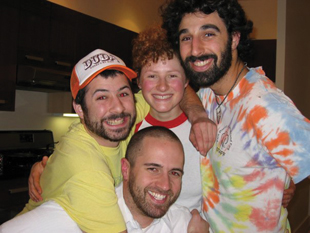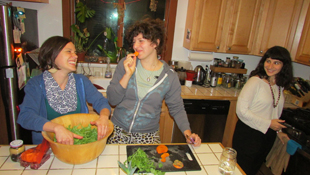Moishe House at 10: Millennial success story in Jewish living
December 11th, 2016
 Where do million-dollar ideas get born? On one now-legendary occasion, the setting was a 2001 Hillel Shabbat dinner in Santa Barbara. That’s where an elderly gentleman asked then-20-year-old David Cygielman out of the blue: What would you do if someone gave you a million dollars, but you weren’t allowed to spend any of it on yourself?
Where do million-dollar ideas get born? On one now-legendary occasion, the setting was a 2001 Hillel Shabbat dinner in Santa Barbara. That’s where an elderly gentleman asked then-20-year-old David Cygielman out of the blue: What would you do if someone gave you a million dollars, but you weren’t allowed to spend any of it on yourself?
Luckily, Cygielman had some answers. It turns out the gentleman, a regular at the Hillel dinners, was an eccentric retired millionaire looking for something meaningful and Jewish to invest in. Morris Squire’s hypothetical $1 million turned into an actual $2 million. And within a few short years, these two men from very different generations went on to create Moishe House, a peer-led Jewish organization that provides dynamic Jewish community to thousands of young adults around the world.

(Bottom photo, from left) Annie-Rose London, Ellie Lotan and Jenny Wyron at Moishe House East Bay (Photo/Hannah Rubin); (top photo, clockwise from left) Jeremy Shuback, Mo Goltz, Analucia Lopezrevoredo, Halley Bass, Meg Stewart and Michael Gropper at S.F. Valencia house
How does it do that? By offering financial incentives to Jewish young adults in their 20s who agree to turn their homes into welcoming hubs for their peers, a population that has aged out of the Jewish life of college campuses but isn’t quite ready for the more adult-oriented events offered by institutions such as JCCs or synagogues.
Since December 2005, when the first two Moishe Houses opened in Oakland and San Francisco, 95 houses have been established in 22 countries, with 300 current residents and more than 880 alumni.
Ask any of the people involved in Moishe House — donors, residents, alumni, staff — why the program has been so successful, and they all will give a version of the same answer: It works because it was needed.
“The old Jewish model was that you throw people out after college, and you wait for them to come back when they got married and joined a synagogue,” said Jordan Fruchtman, Moishe House’s chief program officer. “But what that approach ignores is the huge population of young Jews in their 20s who are hungry for community. Moishe House provides that community. People want it because we’re not telling them how to do it — we leave it completely up to them. All we do is make it possible.”
It’s 8 p.m. on a Wednesday evening at the East Bay Moishe House, and 30 Jewish-identifying young adults are sitting in a circle on Ellie Lotan’s living room floor for a monthly gathering to sing niggun, wordless Jewish melodies. A small shrine, covered in pomegranate seeds and Hebrew letters, sits to the left. A “protect our water” poster is tacked to the wall, next to a pile of tambourines.
Lotan, who lives in the Oakland house with two other women, calls the experience of singing wordlessly in community a “spiritual high.” The event is one of the seven monthly Jewish-interest programs she and her roommates have planned, a central feature of the Moishe House model. Residents in each house receive rent subsidies and funds to run a minimum of five programs per month.
The Bay Area is home to five Moishe Houses, including a Russian-speaking house in San Francisco. No two are the same — while in Oakland the events include race talks and a queer Shabbat, the house in Palo Alto is more likely to serve up challah french toast for post-Yom Kippur noshing and host weekly Shabbat dinners. A Moishe House in Kiev, Ukraine, might present a lecture on Jewish genealogy, while the Buenos Aires house is known for its previas (pre-drinks before social events) and yoga classes.
This flexibility is what makes Moishe House so successful, its adherents say.
“We’re not here to tell anyone what to do, we’re only here to help them do it,” said Cygielman, the Moishe House CEO, about the laid-back approach to cultivating community. “We like the idea that if one house is a little ‘crunchy,’ then you’ll have another house in that same city that is less so. This way, anyone that’s Jewish has a place where they feel comfortable to go.”
Plenty of people have found their comfort zone. In 2015 alone, Moishe House events attracted more than 43,000 unique participants.
With funding from top Jewish philanthropy groups like the Jim Joseph Foundation and the Charles and Lynn Schusterman Foundation, and partnerships with local Jewish federations in nearly every city it resides in, Moishe House celebrated its 10th anniversary last month with galas in London, New York and San Francisco.
Cygielman was 23 and working as the executive director of Squire’s philanthropic Forest Foundation in Santa Barbara, set up to fund local Jewish youth programming. During a weekend visit to his native Oakland, he caught up with some old friends who had met on a Federation teen tour to Israel and were now roommates. Together they bemoaned their lack of Jewish community now that they were in the “Jewish millennial limbo” between college and marriage — so they decided to throw a big potluck dinner for other peers they knew in the area. Squire agreed to donate the heft of the dinner budget.
Eighty people were invited to the event, but the hosts expected a fraction to make it. To their surprise, 73 people showed up. “People sat everywhere — inside, outside. They were coming and going all evening, having the first Shabbat dinner they’d had in a long time,” Cygielman said. “We never expected those numbers.”
Even after that initial success, Cygielman thought it would be a one-off event. But a few days later he received an email from Brady Gill, who was about to move from Oakland to San Francisco with three friends. They wanted to use their home to host Shabbat events on the other side of the bay.
“I was living rent-free in a room in my father’s office, commuting to San Francisco for clown school,” Gill remembered. “I heard about the Shabbat dinners, that there was someone offering to pay for them. Immediately, I wanted in on that.”
When Cygielman approached his boss to ask for more funding, Squire got excited. “Part of the exercise in working for Morris was that everything had to be way bigger than you could imagine it in the beginning,” said Cygielman. “For someone to just do a Shabbat dinner didn’t matter. The question became — could they do a Shabbat dinner every single week?”

Isaac Zones (front) and Brady Gill (hat), both original S.F. Moishe House residents, with Miriam Blachman and Aaron Gilbert in 2006
The pair came up with the idea of offering rent subsidies and a program budget in exchange for a commitment to run regular events, and presented their idea to the roommates at the houses in San Francisco and Oakland. Within quick succession, and just like that, the first two Moishe Houses were born.
“We were scrambling to put on a ton of events and get as many people as possible to show up. We had no idea what it would be or if people would be into it,” said Isaac Zones, a resident in the first San Francisco house. The roommates held a regular poker night, created their own haggadah for Passover seders and started a co-ed softball team called the Matzah Ballstars. “We got to try a bunch of social experiments that were interesting to us, with backing, and see what worked.”
Things developed quickly — within the first year, 10 Moishe Houses opened. After just two years, there were 20, and the operation had gone international. “We were building the airplane as we were flying it, and we were saying yes to everything. The great thing about being funded by one person, and having unlimited funds, was that we could do whatever we wanted,” said Cygielman.
And just as they were flying high, the 2008 stock market crashed happened. One morning in July, Cygielman woke up to learn that the Forest Foundation had closed down and Squire, who was in his late 80s, had decided to move to Thailand.
“We went from full funding, about $1 million per year, to zero funding — overnight,” he said. “I had young Jewish leaders living in houses in 20 cities who wouldn’t be able to pay their next months’ rent. I freaked out.”
It was a moment of crisis, but Cygielman wasn’t ready to give up on the dream.
“David came to us and said that in approximately two weeks, the entire Moishe House project was going to end,” recalled Sandy Cardin, president at the Schusterman Foundation, a Jewish philanthropic initiative. “He asked if we would provide funding necessary to allow the organization to continue. We decided to take that risk with them because we really believed in the project.”

Ellie Lotan (from left), Annie-Rose London and Jenny Wyron, current residents of Moishe House East Bay photo/hannah rubin
The foundation provided $500,000, enough to sustain the project for a few months, and that was followed by another $500,000 from the Jim Joseph Foundation and the Koret Foundation, both based in San Francisco. And then, a year later, the Jewish Federation of the East Bay pitched in. “We were the first federation to give a grant to Moishe House,” said CEO Rabbi James Brandt. “At the time, we were excited — and now we feel like we’ve helped make history.”
Cygielman and some college friends he’d hired to help out filed for nonprofit status, set up a board of directors and paid staff, and came up with policies and procedures. “We closed down anything that wasn’t excellent. We decided that the age range would be from 22 to 30, that each house had to have at least three people living in it,” he said. “This time, we really became Moishe House.”
Though it started as a space for a certain population of postcollege millennials, Ellie Lotan, a resident at Moishe House Oakland, said it has become something more than just a stopover.
“It doesn’t feel like an in-between thing— it feels like the forever lifestyle we’re all choosing, that we’re all trying to create for ourselves,” said Lotan, 31, who has lived in Moishe Houses in both Oakland and Park Slope, Brooklyn, since 2012. “We’re making a commitment to a radical lifestyle, to live communally — to transform what Jewish institutions will look like in the future. I don’t think David Cygielman necessarily envisioned that when he first started out.”
Lotan, who is studying expressive arts therapy at California Institute of Integral Studies in San Francisco, came to Moishe House because of her “lefty” Jewish upbringing and “during a time in my life when I was saying yes to everything. There was a revolutionary feeling — I was feeling brave,” she said.
Housemate Jenny Wyron, 29, said her Reform upbringing caused her constant anxiety that she somehow wasn’t Jewish enough to claim the identity. After discovering the Oakland Moishe House and participating in its events, she said, she became inspired by the way Judaism was being practiced and applied for residency when a spot opened up last year.
“Up until then, my spiritual journey had very little to do with Judaism,” Wyron said. “And then I went to Moishe House and … [it] just made Judaism cool to people.”
The Moishe House in Oakland has a particularly storied place in the community, given how long it has been around. Lotan had a very different experience living in the house in Park Slope.
“People here are more interested in community, more invested in going to each other’s houses, going to events together,” said Lotan. In Brooklyn, they would scrounge to get people to come to Shabbat dinners, she said, while in Oakland people show up to every event. Last year’s Hanukkah NastyNasty party drew 70 people, and the residents are hoping for more at this year’s iteration on Dec. 23 — they’ve invited 600 people on Facebook.
Not every Moishe House resident came to the program because of a commitment to Jewish leadership. David Lewin-Rowen, 29, who grew up in Palo Alto, ended up there after hearing about a cheap vacancy in a house of young Jews. Describing himself as a “kind-of, sort-of-Jewish” Jew, he says he hadn’t explored his Jewish identity much prior to moving into Moishe House Palo Alto last year.
Now he says the experience of Jewish community in his house is unlike any he’s been part of. “Being Jewish can either feel really isolating or really empowering — and up until living in Moishe House, I had never really gotten to feel the empowering part,” said Lewin-Rowen. “It might sound corny, but it has been transformational.”
Kiki Lipsett spent 18 months living in the Vancouver Moishe House in 2011 and 2012. She said she was drawn to “create more young Jewish community” and learn more about her Jewish identity. “It’s an intense experience,” said Lipsett, who grew up Reform. “You’re living and working with people, putting on a lot of programming every month. It takes up your whole world.”
After her time at Moishe House, Lipsett decided to move to Israel to further explore her Jewish heritage. She now lives in Oakland, where she is in school for music therapy and performs music at a variety of Jewish rituals and services in the East Bay.
“We are in the business of belonging,” said Moishe House board member Kevin Waldman. “It doesn’t matter what your views are or where you’re from. With Moishe House, you can make something and you can belong.”
While Cygielman is excited about the exponential growth that has occurred in the 10-year life of the organization, he says he is even more excited about the future. In recent years, programming has been extended outside of the traditional Moishe House arrangement into multiday Jewish learning retreats and “Moishe House Without Walls,” a program that provides funding for young Jewish leaders outside of Moishe Houses to lead workshops, host seminars and run events in more than 100 cities.
According to an internal survey, 11,525 unique participants have attended these programs, and 97 percent report they are “more aware and likely to get involved in other Jewish programming.” Approvals are under review for new houses in Berkeley and South Palm Beach, Florida. Jason Boschan, director of marketing and communications based in the North Carolina office, said the organization receives “at least one application per day, sometimes more.”
“We wouldn’t keep growing if there wasn’t such a high demand — but people are really excited, they want it, all over the world,” said Cygielman. “And I’m excited to lead by following — to keep listening to our residents, to what they need to succeed as Jewish leaders in their communities, and to keep helping them achieve that as best we can.”
First Moishe House residents: Where are they now?
More than 10 years after being pioneers in a Jewish living experiment for young adults, three of the first Moishe House residents reflected on how the experience shaped their life path.
San Francisco resident Leo Beckerman, 33, lived in the first Moishe House D.C. in 2006 and later moved to one of the houses in Los Angeles. During his years at Moishe House, he would cook Shabbat dinners for big crowds — sometimes more than 70 people. That was how Beckerman discovered his love for cooking Jewish-inspired meals. He now does it for a living, as co-founder of Wise Sons Jewish Delicatessen in San Francisco.
Isaac Zones, 35, a Bay Area Jewish musician, was one of the four original residents of the San Francisco house in 2005. He recalls Shabbat dinners that culminated around a bonfire in the backyard, with him playing guitar and leading the group in song.
“Those experiences forced me to get over whatever awkwardness I may have felt about leading spiritual moments for my peers,” said the Oakland resident, who performs at Jewish weddings, holidays and ceremonies with his band Shamati, a “Jewgrass” dance band. “I was pushed into something I wouldn’t haven’t gravitated to normally — it really set me on a path to becoming a Jewish professional.”
Brady Gill, 33, lived in three Moishe Houses in San Francisco and the East Bay from 2006 to 2009, spending his summers as a counselor at Camp Tawonga. He now works as a counselor at Camp Grounded, a digitial detox camp for adults, and is an independent consultant in the field of “connection, play and belonging.”
“The work that I’m doing is within a secular field, but a lot of what I know about connection and belonging comes from my Jewish upbringing, which, since I wasn’t raised religious, come from Moishe House and Camp Tawonga,” the Oakand resident said. “It was only when I was in a position to be teaching Judaism, or leading a community within it, that I was really able to find meaning.” — hannah rubin
Source: “Moishe House at 10: Millennial Success Story in Jewish Living,” J Weekly, December 8, 2016